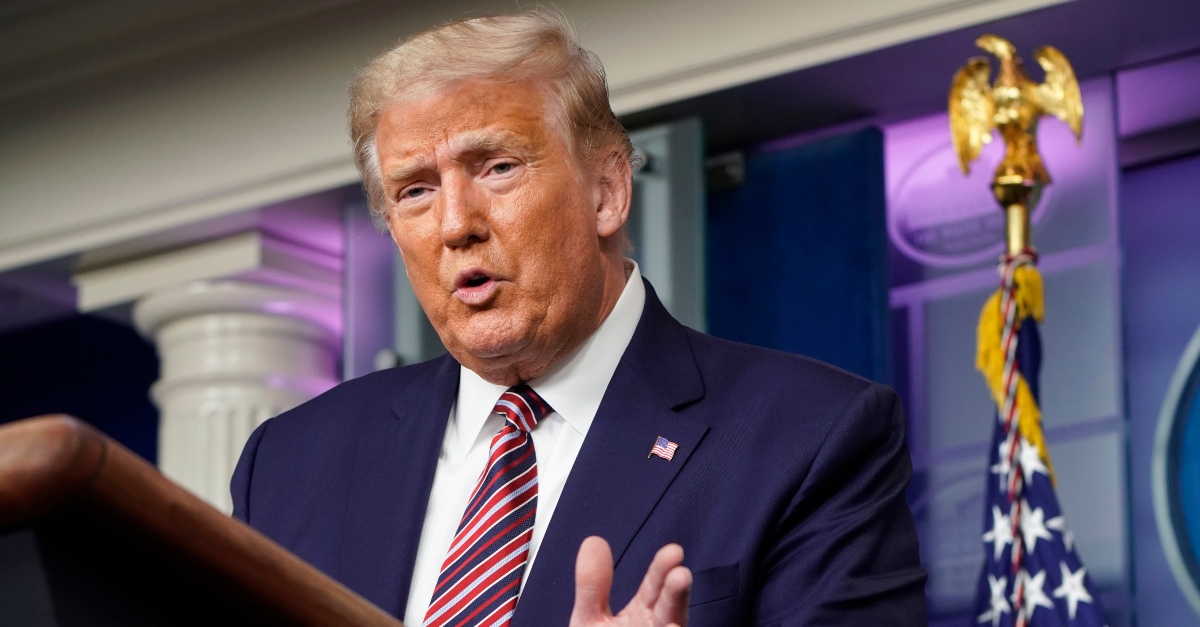
A former lawyer at the Justice Department’s Office of Legal Counsel (OLC) wrote this weekend that competent lawyers who thought continuing to serve at the DOJ under Donald Trump was in the country’s best interest were in fact complicit in damaging U.S. democracy by normalizing and enabling the president’s “assault on reality.”
In an op-ed published Sunday in the New York Times, Erica Newland—who served as an OLC Attorney Advisor from 2016 to 2018—wrote that her job essentially consisted of revising the president’s executive orders to ensure they complied with existing constitutional principles and federal law. Though she first joined the department under President Barack Obama, Newland said she was wrong to believe that narrowly tailoring executive orders, such as the Muslim Ban, would have an anodyne effect on an otherwise destructive and anti-democratic agenda. Newland said her efforts, however, had the opposite outcome, providing legal cover and an air of legitimacy that was reinforced by the courts.
“This burst into public view early in the Trump administration in the litigation over the executive order banning travel from several predominantly Muslim countries, which my office approved,” Newland wrote. “The first Muslim ban was rushed out the door. It was sweeping and sloppy; the courts quickly put a halt to it. The successive discriminatory bans benefited from more time and attention from the department’s lawyers, who narrowed them but also made them more technocratic and therefore harder for the courts to block.”
Shortly after the U.S. Supreme Court upheld the constitutionality of the third and final Muslin Ban in June of 2018, Newland began to realize her efforts—which, in her view, included “matters targeting noncitizens, dismantling the Civil Service, and camouflaging the president’s corruption”—were a bridge too far and worth resigning over.
More recently, Newland said watching President Trump’s unsuccessful attacks on the legitimacy of the election results and the “second rate” lawyering of his campaign attorneys (a.k.a. the “elite strike force” team) brought her to the conclusion that damage could have been avoided if she and other career attorneys had simply walked away from the department—leaving less competent lawyers in their stead.
“The story of the Trump campaign’s attack on our elections could have been the story of the Trump administration’s four-year-long attack on our institutions. If, early on, the Justice Department lawyers charged with selling the administration’s lies had emptied the ranks — withholding our talents and reputations and demanding the same of our professional peers — the work of defending President Trump’s policies would have been left to the types of attorneys now representing his campaign,” she wrote. “Lawyers like Mr. [Rudy] Giuliani would have had to defend the Muslim ban in court. Had that happened, judges would have likely dismantled the Trump facade from the beginning, stopping the momentum of his ugliest and most destructive efforts and bringing much-needed accountability early in his presidency.”
Newland, who now works for the government watchdog group Protect Democracy, said she and her colleagues owed the American people an apology for enabling Trump’s “assault on reality” and “assault on our democracy.”
“No matter our intentions, we were complicit. We collectively perpetuated an anti-democratic leader by conforming to his assault on reality,” she wrote. “We may have been victims of the system, but we were also its instruments. No matter how much any one of us pushed back from within, we did so as members of a professional class of government lawyers who enabled an assault on our democracy — an assault that nearly ended it.”
[image via Joshua Roberts/Getty Images]